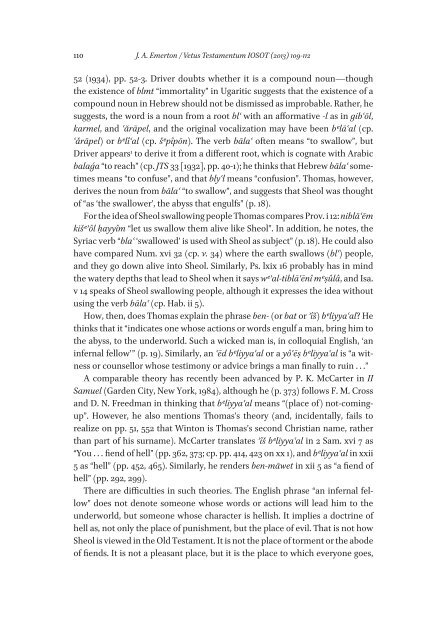Special Issue IOSOT 2013 - Books and Journals
Special Issue IOSOT 2013 - Books and Journals
Special Issue IOSOT 2013 - Books and Journals
Create successful ePaper yourself
Turn your PDF publications into a flip-book with our unique Google optimized e-Paper software.
110 J. A. Emerton / Vetus Testamentum <strong>IOSOT</strong> (<strong>2013</strong>) 109-112<br />
52 (1934), pp. 52-3. Driver doubts whether it is a compound noun—though<br />
the existence of blmt “immortality” in Ugaritic suggests that the existence of a<br />
compound noun in Hebrew should not be dismissed as improbable. Rather, he<br />
suggests, the word is a noun from a root blʿ with an afformative -l as in gibʿōl,<br />
karmel, <strong>and</strong> ʿărāpel, <strong>and</strong> the original vocalization may have been belāʿal (cp.<br />
ʿǎrāpel) or belîʿal (cp. šepîpōn). The verb bālaʿ often means “to swallow”, but<br />
Driver appears 1 to derive it from a different root, which is cognate with Arabic<br />
balaǵa “to reach” (cp. JTS 33 [1932], pp. 40-1); he thinks that Hebrew bālaʿ sometimes<br />
means “to confuse”, <strong>and</strong> that blyʿl means “confusion”. Thomas, however,<br />
derives the noun from bālaʿ “to swallow”, <strong>and</strong> suggests that Sheol was thought<br />
of “as ‘the swallower’, the abyss that engulfs” (p. 18).<br />
For the idea of Sheol swallowing people Thomas compares Prov. i 12: niblāʿēm<br />
kišeʾôl ḥayyîm “let us swallow them alive like Sheol”. In addition, he notes, the<br />
Syriac verb “blaʿ ‘swallowed’ is used with Sheol as subject” (p. 18). He could also<br />
have compared Num. xvi 32 (cp. v. 34) where the earth swallows (blʿ) people,<br />
<strong>and</strong> they go down alive into Sheol. Similarly, Ps. lxix 16 probably has in mind<br />
the watery depths that lead to Sheol when it says weʾal-tiblāʿēnî meṣûlâ, <strong>and</strong> Isa.<br />
v 14 speaks of Sheol swallowing people, although it expresses the idea without<br />
using the verb bālaʿ (cp. Hab. ii 5).<br />
How, then, does Thomas explain the phrase ben- (or bat or ʾîš) beliyyaʿal? He<br />
thinks that it “indicates one whose actions or words engulf a man, bring him to<br />
the abyss, to the underworld. Such a wicked man is, in colloquial English, ‘an<br />
infernal fellow’ ” (p. 19). Similarly, an ʿēd beliyyaʿal or a yôʿēṣ beliyyaʿal is “a witness<br />
or counsellor whose testimony or advice brings a man finally to ruin . . .”<br />
A comparable theory has recently been advanced by P. K. McCarter in II<br />
Samuel (Garden City, New York, 1984), although he (p. 373) follows F. M. Cross<br />
<strong>and</strong> D. N. Freedman in thinking that beliyyaʿal means “(place of) not-comingup”.<br />
However, he also mentions Thomas’s theory (<strong>and</strong>, incidentally, fails to<br />
realize on pp. 51, 552 that Winton is Thomas’s second Christian name, rather<br />
than part of his surname). McCarter translates ʾîš beliyyaʿal in 2 Sam. xvi 7 as<br />
“You . . . fiend of hell” (pp. 362, 373; cp. pp. 414, 423 on xx 1), <strong>and</strong> beliyyaʿal in xxii<br />
5 as “hell” (pp. 452, 465). Similarly, he renders ben-māwet in xii 5 as “a fiend of<br />
hell” (pp. 292, 299).<br />
There are difficulties in such theories. The English phrase “an infernal fellow”<br />
does not denote someone whose words or actions will lead him to the<br />
underworld, but someone whose character is hellish. It implies a doctrine of<br />
hell as, not only the place of punishment, but the place of evil. That is not how<br />
Sheol is viewed in the Old Testament. It is not the place of torment or the abode<br />
of fiends. It is not a pleasant place, but it is the place to which everyone goes,








![Am HaSefer [Volk des Buches] - Books and Journals](https://img.yumpu.com/20648352/1/174x260/am-hasefer-volk-des-buches-books-and-journals.jpg?quality=85)







